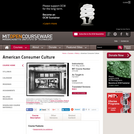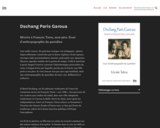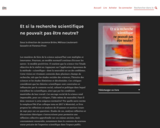Missive à François Tatou, mon père. Essai d'anthropographie du quotidien
Short Description:
Une malle s’ouvre. De précieux vestiges s’en échappent : photos impeccablement conservées par la douce vigilance d’une épouse, ouvrages jadis passionnément annotés, polycopiés aux signatures illustres, agendas nimbés de la patine du temps. Voilà le matériau à partir duquel l’autrice construit l’épistémologie particulière de cette si longue lettre par laquelle, portée par la fratrie, une fille parle à son père. Et voici lancée non pas une saga familiale, mais une anthropographie du quotidien de leurs vies. Réflexivité et catharsis. NewParaD’abord Dschang, sur les plateaux verdoyants de l’ouest du Cameroun où est né François Tatou « vers 1928 ». Son parcours de vie s’acheva aux confins du Sahel, dans une ville rebaptisée tendrement ici Garoua la Belle. Entre les deux, juste après les Indépendances, Paris où François Tatou acheva sa formation à l’Institut des Hautes Études d’Outre-mer, ce lieu qui forma de nombreux cadres de la haute fonction publique d’Afrique francophone. NewParaAu fil de la missive, sa fille met en scène un ressenti commun sur des enjeux toujours d’actualité : la femme dans la cité, les défis et dépits du multilinguisme, la scénarisation - brutale ou feutrée - des chocs culturels, l’assignation à résilience, le développement humain et social, l’urgence primordiale de la gestion pertinente des savoirs.
Long Description:
Une malle s’ouvre. De précieux vestiges s’en échappent : photos impeccablement conservées par la douce vigilance d’une épouse, ouvrages jadis passionnément annotés, polycopiés aux signatures illustres, agendas nimbés de la patine du temps. Voilà le matériau à partir duquel l’autrice construit l’épistémologie particulière de cette si longue lettre par laquelle, portée par la fratrie, une fille parle à son père. Et voici lancée non pas une saga familiale, mais une anthropographie du quotidien de leurs vies. Réflexivité et catharsis.
D’abord Dschang, sur les plateaux verdoyants de l’ouest du Cameroun où est né François Tatou « vers 1928 ». Son parcours de vie s’acheva aux confins du Sahel, dans une ville rebaptisée tendrement ici Garoua la Belle. Entre les deux, juste après les Indépendances, Paris où François Tatou acheva sa formation à l’Institut des Hautes Études d’Outre-mer, ce lieu qui forma de nombreux cadres de la haute fonction publique d’Afrique francophone.
Au fil de la missive, sa fille met en scène un ressenti commun sur des enjeux toujours d’actualité : la femme dans la cité, les défis et dépits du multilinguisme, la scénarisation – brutale ou feutrée – des chocs culturels, l’assignation à résilience, le développement humain et social, l’urgence primordiale de la gestion pertinente des savoirs.
Word Count: 52085
ISBN: 978-2-924661-72-7
(Note: This resource's metadata has been created automatically by reformatting and/or combining the information that the author initially provided as part of a bulk import process.)




